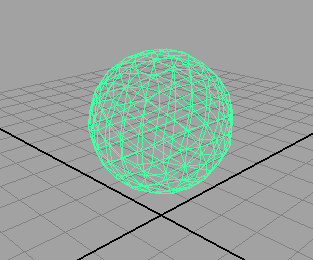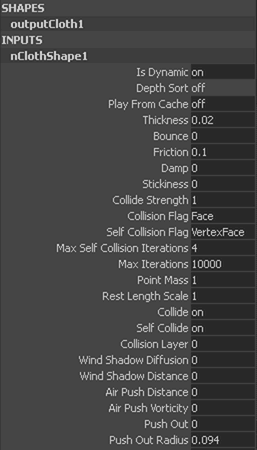
This example will show you how to create a flexible skin for a virtual balloon.
To model the balloon you will create a Icosahedron. This will result in more realistic movement than a polygon sphere.
 .
.
In this example the balloon model for the balloon will remain spherical. You can optionally reshape the model into a more balloon-like shape.

 -click the balloon and select Face from the marking menu that appears.
-click the balloon and select Face from the marking menu that appears.
The balloon now appears in face selection mode.


 .
.
Now that you have the basic shape for your inflated balloon, you need to configure the balloon’s attributes so it acts like a balloon and its initial state so it starts deflated.
To adjust the balloon's attributes
The deflated balloon falls to the floor.

To set the balloon's initial state
 .
.
Maya will automatically playback the scene to frame 200 and save the balloon simulation to disk.
Now that the balloon begins deflated you can animate the balloon inflating and then deflating.

 -click Seal Holes to include it in the selection.
-click Seal Holes to include it in the selection.  -click either name and select Key Selected from the context-sensitive menu that appears.
-click either name and select Key Selected from the context-sensitive menu that appears.
The fields will change color to confirm you set the keys correctly.

 -click the name and select Key Selected from the context-sensitive menu that appears.
-click the name and select Key Selected from the context-sensitive menu that appears.
The balloon inflates very quickly initially, and then slows down until frame 200.

 -click Seal Holes to include it in the selection.
-click Seal Holes to include it in the selection.  -click either name and select Key Selected from the context-sensitive menu that appears.
-click either name and select Key Selected from the context-sensitive menu that appears.
The fields will change color to confirm you have set the keys correctly.
 -click the name Seal Holes and select Key Selected from the context-sensitive menu that appears.
-click the name Seal Holes and select Key Selected from the context-sensitive menu that appears.
 -click the name Pressure and select Key Selected from the context-sensitive menu that appears.
-click the name Pressure and select Key Selected from the context-sensitive menu that appears.
At frame 300 the balloon flies away due to the release of air from the hole in the geometry.
 Except where otherwise noted, this work is licensed under a Creative Commons Attribution-NonCommercial-ShareAlike 3.0 Unported License
Except where otherwise noted, this work is licensed under a Creative Commons Attribution-NonCommercial-ShareAlike 3.0 Unported License